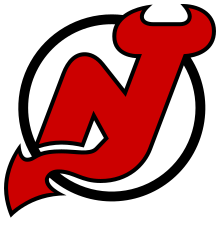| New Jersey Devils | |
|---|---|
 | |
| Conference | Eastern |
| Division | Metropolitan |
| Founded | 1974 |
| History | Kansas City Scouts 1974–1976 Colorado Rockies 1976–1982 New Jersey Devils 1982–present |
| Home arena | Prudential Center |
| City | Newark, New Jersey |
 | |
| Team colors | Red, black, white[1][2][3] |
| Media | |
| Owner(s) | |
| General manager | Tom Fitzgerald |
| Head coach | Sheldon Keefe |
| Captain | Nico Hischier |
| Minor league affiliates | Utica Comets (AHL) Adirondack Thunder (ECHL) |
| Stanley Cups | 3 (1994–95, 1999–00, 2002–03) |
| Conference championships | 5 (1994–95, 1999–00, 2000–01, 2002–03, 2011–12) |
| Presidents' Trophy | 0 |
| Division championships | 9 (1996–97, 1997–98, 1998–99, 2000–01, 2002–03, 2005–06, 2006–07, 2008–09, 2009–10) |
| Official website | nhl |
The New Jersey Devils are a professional ice hockey team based in Newark, New Jersey. The Devils compete in the National Hockey League (NHL) as a member of the Metropolitan Division in the Eastern Conference. The club was founded as the Kansas City Scouts in Kansas City, Missouri, in 1974. The Scouts moved to Denver in 1976 and became the Colorado Rockies. In 1982, they moved to East Rutherford, New Jersey, and took their current name, which is derived from the legendary Jersey Devil creature. For their first 25 seasons in New Jersey, the Devils were based at the Meadowlands Sports Complex in East Rutherford and played their home games at Brendan Byrne Arena (later renamed Continental Airlines Arena). Before the 2007–08 season, the team moved to Prudential Center in Newark. The Devils are owned and managed by Harris Blitzer Sports & Entertainment (HBSE), with founders Josh Harris and David Blitzer acquiring the team in 2013.
The franchise was poor to mediocre in the eight years before moving to New Jersey, a pattern that continued during the first five years in New Jersey as they failed to make the Stanley Cup playoffs and never finished higher than fifth in their division, which had six teams at the time. Their fortunes began to turn around following the hiring of the president and general manager Lou Lamoriello in 1987. Under Lamoriello's stewardship, the Devils made the playoffs all but three times between 1988 and 2012, including 13 berths in a row from 1997 to 2010, and finished with a winning record every season from 1992–93 to 2009–10. They have won the Atlantic Division regular season title nine times, most recently in 2009–10, before transferring to the newly created Metropolitan Division as part of the NHL's realignment in 2013. The Devils have reached the Stanley Cup Finals five times, winning in 1994–95, 1999–2000 and 2002–03, and losing in 2000–01 and 2011–12. The Devils were known for their defense-first approach throughout their years of Cup contention, and were one of the teams credited with popularizing the neutral zone trap in the mid-1990s.
The Devils have a rivalry with their cross-Hudson River neighbor, the New York Rangers, as well as a rivalry with the Philadelphia Flyers. The Devils are one of three NHL teams in the New York metropolitan area; the others are the Rangers and the New York Islanders. The Devils are one of four major professional sports teams that play their home games in New Jersey; the others are the National Football League's New York Giants and New York Jets, and the New York Red Bulls of Major League Soccer. Since the relocation of the New Jersey Nets to Brooklyn in 2012, the Devils have been the only major league team in any sport to bill themselves as representing the state of New Jersey.
- ^ Getty, Bradley (June 19, 2017). "History behind the jersey". NewJerseyDevils.com. NHL Enterprises, L.P. Retrieved October 11, 2020.
- ^ Creamer, Chris (June 13, 2017). "Greatest NHL logos of all time". NHL.com. NHL Enterprises, L.P. Retrieved November 2, 2021.
When the Colorado Rockies moved east in 1982, they changed everything. The result was the New Jersey Devils, named after the legend of the "Jersey Devil," a mysterious beast reported to be seen around the state for years. The logo is an N and J mashed together to form a single letter with devil horns at the top of the N and a pointed tail at the end of the J. The original colors, red and green, were chosen because New Jersey is nicknamed the "Garden State" (black replaced green for 1992-93).
- ^ "Organizational Directory" (PDF). 2023-24 New Jersey Devils Media Guide. Retrieved January 1, 2024.
Cite error: There are <ref group=lower-alpha> tags or {{efn}} templates on this page, but the references will not show without a {{reflist|group=lower-alpha}} template or {{notelist}} template (see the help page).